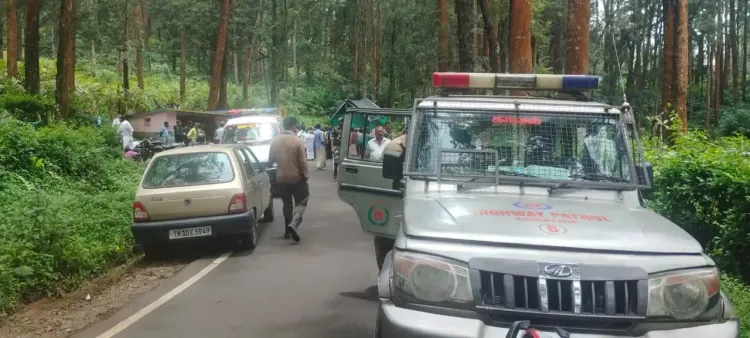Is Human Encroachment Causing Deadly Wild Elephant Attacks in Gudalur?

Synopsis
Key Takeaways
- Human encroachment is a leading cause of wildlife conflicts.
- Protests can lead to increased awareness and action from authorities.
- The Forest Department is urged to improve response strategies.
- Effective management of wildlife is crucial for community safety.
- Trained kumki elephants could help mitigate future incidents.
Chennai, Aug 11 (NationPress) In a tragic incident highlighting the ongoing struggle between humans and wildlife, a 60-year-old plantation worker from Kerala was tragically killed by a wild elephant in Gudalur, Tamil Nadu, on Monday. This event has sparked significant protests from local residents, who are expressing their frustration over the perceived inaction of the Forest Department.
The victim, known as Mani, hailed from Oveli New Hope in Gudalur and was working at a local private estate.
The fatal encounter occurred as he was en route to his workplace. Fortunately, a colleague who was with him escaped without injury. Mani's family relocated from Palakkad, Kerala, to Gudalur several years prior, seeking employment opportunities.
Eyewitness accounts reveal that the elephant, which had been wandering into human habitats for about 20 days, unexpectedly charged toward the workers.
Residents claim they have made numerous reports to the Forest Department urging them to return the animal to its natural habitat, all of which have seemingly been ignored.
In response to the tragedy, frustrated locals staged a protest at the scene, demanding that officials refrain from removing Mani's body until they receive firm commitments regarding effective measures to address the elephant threat and appropriate financial support for the grieving family.
Protesters accused the Forest Department of negligence, arguing that no substantial actions were taken despite the ongoing fear caused by the elephant.
Incidents involving wild elephant incursions have been a persistent issue in Gudalur and surrounding areas of the Nilgiris district, resulting in multiple fatalities in recent years.
Earlier this year, a 55-year-old woman was killed in Pandalur while gathering firewood, and in April, a farmer in Devarshola lost his life due to a similar attack. Last November, a daily wage laborer was also trampled to death in Thorappalli village.
Conservationists point out that the loss of habitat, disruption of elephant corridors, and increasing human encroachment into forested areas are compelling elephants to seek food and water in populated regions.
However, local residents argue that the Forest Department should enhance patrolling efforts, establish early warning systems, and utilize trained kumki (domesticated) elephants to safely redirect rogue elephants.
Officials have stated that they are working to track and guide the elephant back to its forest habitat. Following the post-mortem at Gudalur Government Hospital, Mani's remains were returned to his family for cremation.










